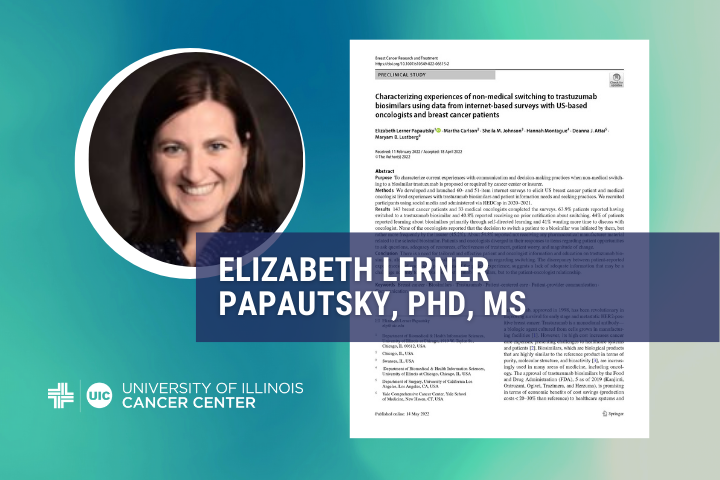
Effective communication is essential for oncologists who are switching their HER2-positive breast cancer patients from biologic trastuzumab to a product similar in structure and function, according to new research at the University of Illinois Cancer Center.
“Our study suggests that patients and oncologists are not on the same page. Whereas oncologists report that a switch to a trastuzumab biosimilar is not a big deal, patients report that it’s worrisome,” said Elizabeth Lerner Papautsky, PhD, MS, assistant professor of biomedical and health information sciences in the UIC College of Applied Health Sciences and lead author of the study published in the journal Breast Cancer Research and Treatment.
“These uncertainties can be alleviated with effective information/communication because trastuzumab biosimilars are highly similar in safety and effectiveness as the reference drug, Herceptin. Our study may focus on trastuzumab biosimilars, but ultimately it’s really about patient-provider communication.”
Approved in 1998, trastuzumab has been revolutionary in improving the survival of patients with early stage and metastatic HER2-positive breast cancer. The drug is a monoclonal antibody, cultured from cells grown in manufacturing facilities. However, its high cost increases cancer care expenses, presenting challenges to healthcare systems and patients, said Papautsky, a member of the Cancer Center’s Cancer Prevention and Control program.
Biosimilars, which are comparable to the existing product in terms of purity, molecular structure, and bioactivity, are increasingly used in many areas of medicine, including oncology. The market for biosimilars in the United States is expanding, with large hospital systems and insurers choosing them over the reference drug. Despite the growing popularity of biosimilars, knowledge gaps continue to be a challenge for both clinicians and patients, she said.
Papautsky and her research team developed two different surveys. The first, containing 60 items, was designed for U.S. patients diagnosed with HER2-positive breast cancer. Oncologists received a survey with 51 items. Both surveys were designed by a patient advocate and oncologist, and refined by a social scientist.
Nearly 145 breast cancer patients completed the survey, along with 33 oncologists. Almost 64% of the patients reported switching to a trastuzumab biosimilar and nearly 41% reported receiving no prior notification about switching. Forty four percent of patients learned about biosimilars through their own research, and 41% wanted more time to discuss their findings with their oncologist, Papautsky said.
None of the oncologists reported that the decision to switch a patient to a biosimilar was initiated by them, but rather more frequently by the insurer (45.2%). About 55% reported not receiving any materials from pharmaceutical manufacturers related to the selected biosimilar. Patients and oncologists differed in their responses regarding patient opportunities to ask questions, adequacy of resources, treatment effectiveness, patient worry and magnitude of change, Papautsky said.
“There is a need for tailored and effective patient and oncologist information and education on trastuzumab biosimilars, along with improved healthcare communication regarding switching,” Papautsky said. “Our research found there is a discrepancy between patient-reported experiences and oncologist perceptions of the patient experience, suggesting a lack of adequate information that may be a challenge not only to the uptake of trastuzumab biosimilars, but to the patient-oncologist relationship.”
The study, “Characterizing experiences of non-medical switching to trastuzumab biosimilars using data from internet-based surveys with US-based oncologists and breast cancer patients,” was funded by the National Comprehensive Cancer Network (NCCN) and Pfizer Global Medical Grants Adoption of Biosimilars in Oncology (Grant G1740). The UIC Center for Clinical and Translational Science UL1TR002003 provided access to REDCap and associated technical support.
Papautsky was assisted by patient advocates Martha Carlson, Chicago, and Sheila M. Johnson, Swansea, Ill.; her student Hannah Montague, UIC; and clinicians Deanna J. Attai, University of California Los Angeles, and Maryam Lustberg, Yale University.
